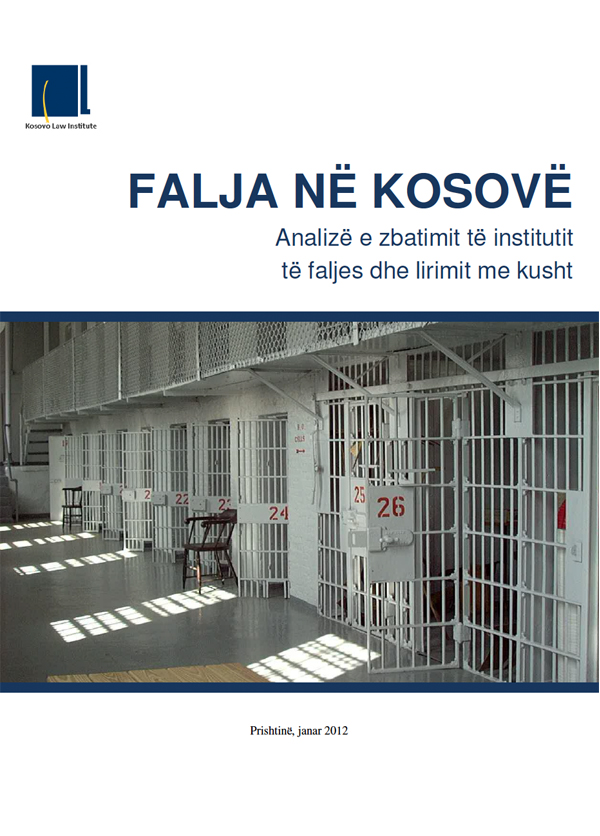Kosovo Law Institute (KLI) held today a press conference where the report is published: “Pardon in Kosovo: Analysis of the implementation of the pardon and conditional release institute”. The report comes as a result of six months of research work, including the examination of the legal framework, the analyzing pardoning and conditional release practices as well as deep interviews with involved stakeholders.
KLI has found significant legal deficiencies regarding the right implementation of the institute of pardon including conditional release. Despite the general laws, the implementation authorities of pardon institute had failed to provide correctness and justice for the sentence. The most exhilarating case was the violation of the Constitution and the Law on Forgiveness, which was made by the President Fatmir Sejdiu in 2010 pardoning the sentenced for trafficking in persons.
Betim Musliu co-author of the report said that pardon in contradiction with the Constitution and the Law could only be done by those who may be ignorant of the legal field, on the contrary for such a violation should be investigated that what were the materials or political benefits. Musliu invited the State Prosecutor to investigate unlawful forgiveness’s. Presidents for three years had pardoned 151 sentence, or 67% of the general list, who had previously been rejected by the Conditional Release Panel.
Their enormous forgiveness has not gone unnoticed in the European Commission’s Progress Report 2010 in Kosovo. Despite the fact that such a phenomenon has questioned the whole process of pardon evaluation, Acting President Jakup Krasniqi has continued with the same practice where from 103 forgiven, 59 of them were previously refused by the Conditional Release Panel. Pardon of the refused on conditional release is a concern raised in the Progress Report on Kosovo, therefore the forgiveness of this category should not be allowed.
This will also happen if the Kosovo Assembly approves amendments to the Criminal Code which forbids the pardon of conditional release refusals. Therefore, urgently should be initiated the amendment of the Law on Forgiveness”, Musliu said.
Only in 2011, sentenced for murders and serious murders were pardoned for 135 years or 86% of the total time pardoned that year. During the three years of the implementation of the institute of pardon, the presidents have pardoned sentenced for triple murder, murder by unscrupulous revenge, murder in co-operation, trafficking in human beings, organized crime, narcotics, corruption, rape and recidivists. The pardon of sentence has a significant impact on the justice system in general, especially in the practice of sentence imposed by judges. Betim Musliu co-author of the report stated that “The Decree of Criteria for the Pardon of the President issued in 2012 has significantly improved the definition of the criteria and their specification by giving a more responsible dimension to the implementation of pardon. But this is not enough and the problem of pardon can be regulated by initiating the change and fulfillment of the pardon law.”
Another concerning issue raised in the analysis is the composition of the Ad Hoc Commissions of Presidents’ Pardon in the past, which had been populated by people of certain parties. In 2010, the Ad hoc Commission for Pardoning the President was made up of people mainly from the LDK, as President Sejdiu at the same time kept his position frozen by the LDK Chairman.
The Pardon of Presidents, apart from the legal aspect of changing the status of the sentenced person, has also influenced the decision-making of Panel, to conditionally release the sentenced. Much of the prisoners, who had received pardon afterwards, were also conditionally released by the Conditional Release Panel. The various affairs of the officials of Conditional Release Panel, had affected to the loss of confidence that conditional release could only be done through corruption. The State Prosecutor has failed to disclose suspicious corruption activities in this panel. Since 2002, out of 2885 sentenced have been asked for conditional release, 885 of them have received a positive response. A right which is denied to prisoners in Kosovo is amnesty. This institute is still out of the Constitution, and consequently not applicable. The analysis also contains a number of other findings as well as specific recommendations for each institution involved in the implementation of the institute of pardon and conditional release.

